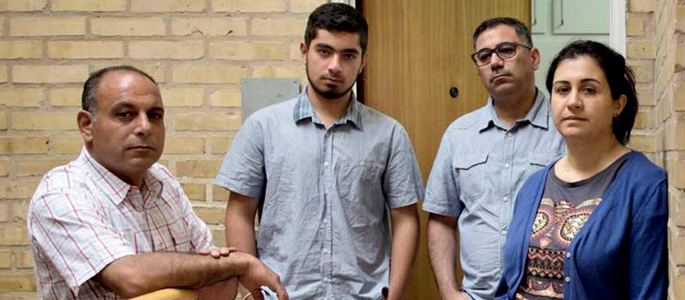Danish Supreme Court accepts 3 years waiting period for family reunification
The European Court on Human Rights must now decide whether it is in breech of the conventions when Denmark separates Syrian refugees on purpose
Photo: Amnesty International Danmark
Five Syrian refugees filed a case against the Danish state last summer, represented by one of the most respected Danish human right lawyers, Christian Dahlager. Refugees Welcome put four of them in contact with the lawyer and assisted with the formal application for family reunification. One of them, a woman, got permission for her husband and her children shortly after, as she was granted an exemption.
The case concerns the tightening of the Danish Alien Act which was passed in two steps. First the Helle Thorning government introduced in 2015 a special, general and temporary status for Syrian refugees without individual asylum motives – and at the same time 1 years waiting time to apply for family reunification. Back then the legal experts from the government found that this was as far as they could go within the conventions. The government Lars Løkke challenged this in January 2016, when minister Støjberg put forward a proposal to raise the waiting time to 3 years.
Danish Institute for Human Rights warned against the law and found it a clear breech, and has afterwards supported the five Syrians case against the state. In the law proposal itself the legal experts from the government actually admitted a risk that it might be in breech of the conventions. Both the European Convention on Human Rights and the UN Refugee Convention contain articles about the right to reunite a family which has been separated.
Since the law was passed, several thousands have been affected by it. Around 40% of the Syrians in Denmark receive the temporary status art. 7 (3) with the 3 years waiting time.
As the case against Denmark was principal, it went past the city court and directly to the national court, where the law was accepted as legal – and the case was appealed to the supreme court as an urgent matter. Here the judges also found that the law was within the frame of the conventions. So now it continues to the court on Strasbourg, where it will also be relevant for the six other European countries that have introduced waiting periods – among them Germany. Sweden has totally abandoned the right to family reunification for refugees who don’t have convention status, but that law is temporary.
The supreme court finds that the right of the state to control migration is is a reasonable proportion to the applicants right to family reunification – in spite of the number of asylum seekers arriving in Denmark being the lowest in many years. The judgement also attaches a great deal of importance to the fact that the applicant is not a refugee with convention status and individual asylum motive, but in risk of general danger, and that the separation is only temporary. To this can be argued that the applicant has been granted leave to stay here because the general risk for everybody is so high in Syria, and this risk is exactly what his wife will be exposed to for 3 years, while he can sit here in safety.
Read more:
The supreme court ruling (in Danish)
If you still have a sense of humanity… (March 2016)
The asylum restrictions in brief summary (January 2016)
Syrians sue Danish state for 3 years waiting time (June 2016)
Refugees Welcome told Omar's and Anas' story
and led them on the way to the principal case


